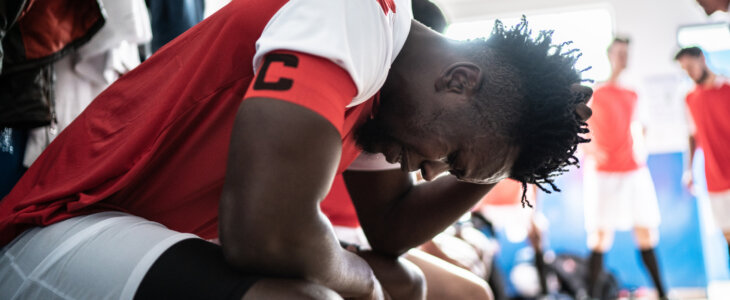Like so many other injuries and conditions, sports concussions respond exceptionally well to the nonsurgical approach of the doctors at Long Island Spine Rehabilitation Medicine. We are delighted to now have Dr. Chator, an expert on acute concussions, on our team. With his specialized knowledge and experience, we provide the highest standard of care for individuals recovering from sports-related concussions.
What Exactly Is a Concussion?
A concussion is a type of traumatic brain injury caused by a blow to the head, neck, or body. The force of impact causes the brain to move within the skull and make contact with the hard covering that usually protects it from harm. This force disrupts normal brain function to a greater or lesser degree, depending on the severity of the injury.
How Sports Concussions Occur
Though concussions can result from any type of accident, they are relatively common in contact sports, such as:
- Football
- Soccer
- Hockey
- Rugby
- Basketball
- Wrestling
- Lacrosse
In these high-impact sports collisions, falls, or direct blows to the head or body are not rare, so the risk of concussion is elevated. Even non-contact sports, such as golf, tennis, gymnastics, swimming, or cycling, can result in concussions. It is critical that injured players, even if they feel able to continue playing, be immediately evaluated by a medical professional to avoid dangerous health consequences.
Damage Caused By Sports Concussions
Because the brain is such a vital and complex organ, brain damage, even when mild, can affect a wide range of functions: physical, cognitive, emotional, and behavioral. That’s why it is so important to have individuals who are suspected of having suffered concussions examined by a skilled doctor familiar with this problem. If you or someone you love has suffered a head or body blow, now is the time to contact LI Spine for an appointment.
Signs and Symptoms of a Sports Concussion
It is vital to know the many diverse signs and symptoms of a sports concussion since they may be subtle or delayed. Symptoms of a sports concussion may include any combination of the following:
- Balance problems
- Confusion or disorientation
- Difficulty concentrating
- Disturbances in smell or taste
- Drowsiness or fatigue
- Headache, dizziness, pressure in the head
- Irritability, rage, depression, or other personality changes
- Memory loss (amnesia)
- Nausea or vomiting
- Ringing in the ears
- Sensitivity to light and noise
- Sleep disturbances
- Slurred speech
- Temporary loss of consciousness
- Visual disturbances, e.g. “seeing stars”
It is worth noting that a concussion can occur without any loss of consciousness.
Why Delayed Diagnosis and Treatment Are Risky
There are several reasons to take prompt action if you suspect a concussion, including:
- To prevent secondary injury — an untreated concussion can increase the risk of secondary injuries (second-impact syndrome), which can have life-threatening consequences.
- To mitigate long-term effects — prompt treatment reduces the likelihood of long-term cognitive, emotional, and physical impairments associated with repeated concussions.
- To ensure a safe return to sports activity — proper management is essential for a safe return to sports by promoting faster healing and minimizing the risk of recurrent concussions.
How Sports Concussions Are Diagnosed
Diagnosing a sports concussion typically involves a thorough evaluation by an experienced healthcare professional. At Long Island Spine Rehabilitation Medicine, we diagnose concussions by:
- Reviewing patient symptoms and medical history
- Performing a neurological examination
- Administering a cognitive assessment
- Testing balance and coordination
- Administering imaging studies (e.g. MRI or CT scan) to rule out other injuries or abnormalities
Clinical judgment and familiarity with concussion diagnosis play critical roles in evaluating symptoms and findings among various individuals. This is why having Dr. Chator on our staff is invaluable.
How Our Doctors Help Sports Concussions Heal
Until fairly recently, rest was the foremost recommended treatment for sports concussions. As a result of advanced studies, however, modern medicine now recommends a more nuanced approach to concussion treatment. According to recent findings, after a few days of rest, modified physical activities should be gradually added to the patient’s regimen, along with symptom management and targeted therapies such as vestibular rehabilitation and vision therapy.
In fact, it has been determined that removing all physical activity and mental stimulation, while helpful in the immediate aftermath of a concussion, can actually slow healing and worsen symptoms if continued. Emerging science shows us that maintaining social connections has a positive effect on improving health after a brain injury, accelerating the recovery process.
Therefore, at Long Island Spine Rehabilitation Medicine, we offer personalized treatment plans that include a combination of:
- Rest and activity modification
- Physical therapy to improve strength and coordination
- Corticosteroid injections to reduce pain and inflammation
- Vestibular therapy to improve balance
- Cognitive rehabilitation to restore mental function
- PEMF, PRP, and acupuncture to promote rapid healing
- Medications to alleviate headaches, nausea, or sleep difficulties
- Guidance to encourage proper nutrition, hydration, and sleep habits
We are committed to providing comprehensive care for sports concussions, ensuring that every patient receives the personalized attention and support they need to recover fully and resume their active lifestyles.
Contact Our Experienced Sports Concussion Doctors Now
If you know or suspect that you or a loved one has experienced a sports-related concussion, don’t hesitate to reach out to us. Our team is well-positioned to support you by accurately diagnosing your injury and providing you with cutting-edge treatment. Dr. Chator and our other highly capable physiatrists have the know-how to guide you through this frightening and uncomfortable period. Contact us today and let us make you feel better and put you back in the game.
